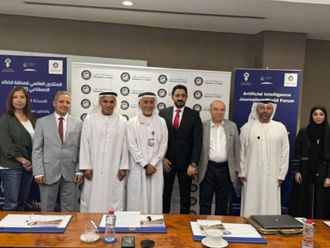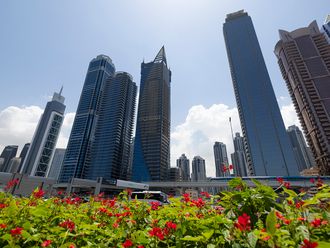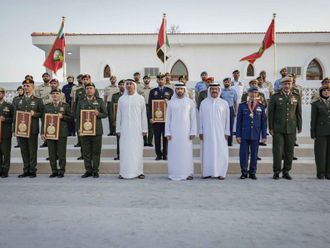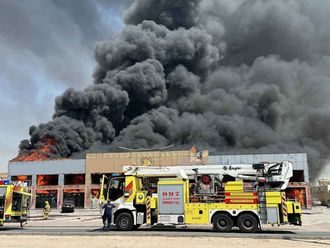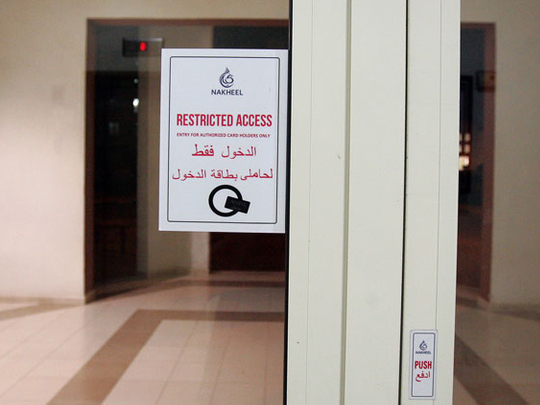
Dubai: Tenants in Dubai’s sprawling International City development will not be able to enter buildings without new access cards, which means illegal tenants and unauthorised visitors will not be able to enter the premises, a move some residents welcomed while others fear a crackdown on “bachelor and illegal subletting”.
It is believed that International City hosts 100,000 people, including many low-income employees, according to unofficial estimates.
Residents have been told through notices on building entrances that they will need the cards once a new door access system goes live.
Tenants told Gulf News they believe the move to be related to controlling overcrowding in apartments.
The notices say the new system, including security cameras, is being installed “in the interests of upholding the property value of individual units and enhancing security and safety of the community”.
No starting date for the new system has been given in the notices by Nakheel Owners Association Management.
International City is an 800-hectare development by property giant Nakheel, divided into several districts and clusters named after countries.
Earlier notices on front entrances include warnings by management Trakhees against overcrowding. Many apartments there are overcrowded with low-income workers who moved in to take advantage of falling rents, with some subletting illegally.
A total of 1,310 penalties for overcrowding have been issued since 2010, Trakhees told Gulf News in a statement.
“The fine for overcrowding is Dh108 per square metre. The fine is addressed to the landlord; however, a hard copy of the letter is issued to the tenant,” it said.
“Trakhees has a team of inspectors to carry planned inspections on a daily basis.”
Trakhees has already said in its notices that it is “strictly regulating the number of persons allowed to occupy a residential unit within the jurisdiction”.
Only one person per 200 square feet will be allowed to occupy an apartment or villa.
“To strictly implement the regulations and to prevent hazards to the residential communities because of overcrowding, Trakhees is conducting and will continue to conduct random inspections within communities.”
The warning – in English, Urdu, Hindi, and Mandarin – adds that “penalties will be implemented on the violators of such regulations”.
Residents have also been urged in the notice to report overcrowding cases to Trakhees.
They inform residents that they will not be able to access the building without the cards, adding: “Once installation is completed, you will be notified to apply and collect access cards.”
Several residents told Gulf News they have not yet been notified about the card application and collection process, with no information on what documents and costs will be involved.
Dozens of buildings have already been fitted with card readers, which are not yet activated.
It is understood the number of cards issued will be limited according to each unit’s specifications such as size and number of tenants allowed.
An immediate comment from Nakheel regarding the access cards was not available by the time of going to press on Tuesday.
Meanwhile, residents have had a mixed reaction to the development, with some welcoming the move and others fearing a crackdown.
An Indian landlord of a flat in the China cluster said: “This is great news, it’s just what was needed. The illegal tenants will be forced out, the community will become attractive to families. And I can rent out my flat for a higher price.”
A Pakistani taxi driver who shares a one-bedroom apartment with five others in the France cluster said he expects rents to rise following the access system activation.
“We together pay Dh2,500 total for our flat. Where will we go if the rents rise or if access cards are not given to everyone? We are living very modestly already, we can’t afford more expenses,” he added.
Another Pakistani tenant, Tareq Mohammad from the Morocco cluster, added: “We don’t yet know exactly how this new system will work, or what effect it will have. We’re waiting for more official news or notices.
“But it’s definitely something that has got everyone talking. There are rumours going around that the ‘bachelors’ have started to leave. You can’t wait until the last moment if there’ll be a crackdown; you need time to look for alternative housing.”





